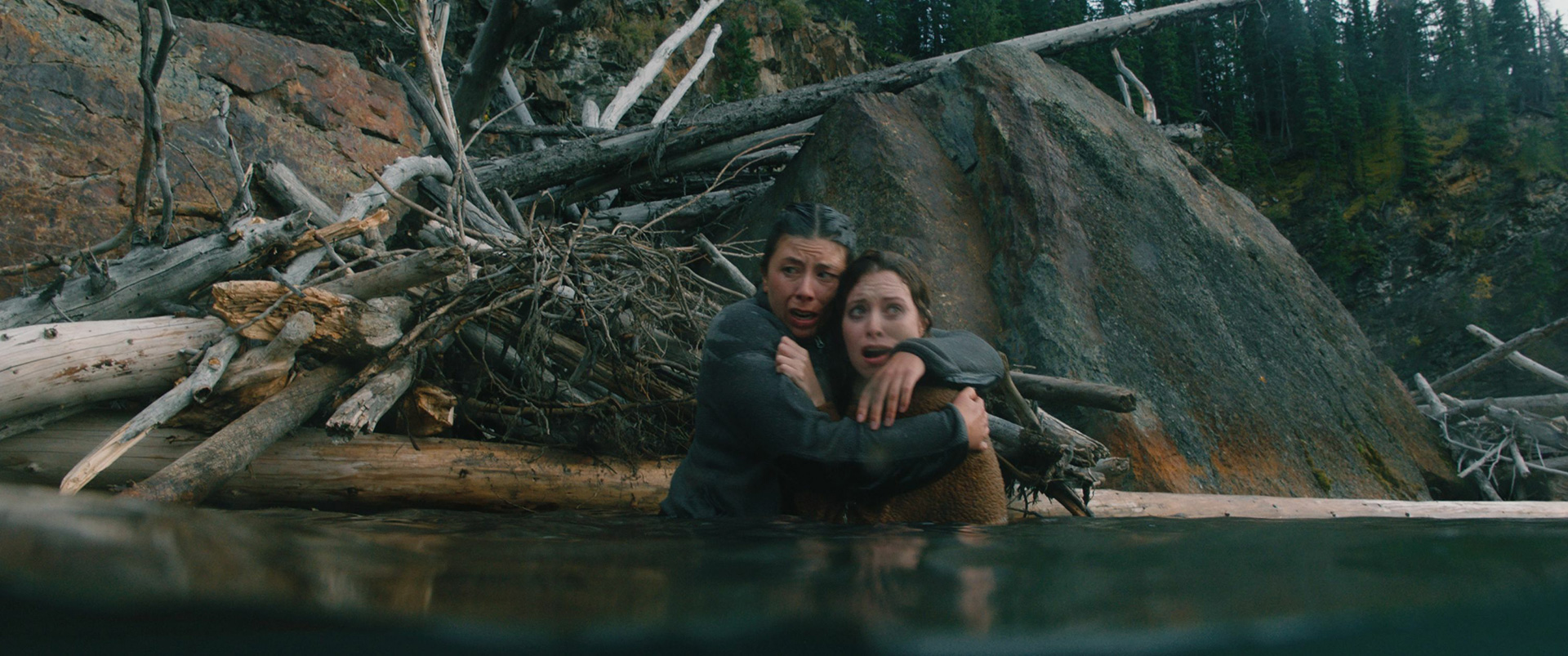There’s risk dealing with a therapy group like that at the center of Berkley Brady’s directorial debut Dark Nature: the narrative quite often needs to turn into a “Trauma Olympics” if it’ll progress. She knows this and even includes the sentiments as a joke early on when one of Dr. Dunnley’s (Kyra Harper) usual patients Shaina (Roseanne Supernault) speaks about why she’s attending this woodland retreat in the Treaty 7 territory of northern Alberta (Brady is a Métis filmmaker) before trivializing those of newcomer Joy (Hannah Emily Anderson). It’s an important moment, reminding us the potency of trauma isn’t about some objective scale of relativity. Whether war (Shaina) or domestic abuse (Joy), the resulting suffering these women face is what matters.
It can be difficult to separate, especially when the correlation aligns for some. While the psychological horrors Joy faces appear stronger than Shaina’s—either because they’re fresher or because she doesn’t have the tools to deal with them as effectively—one could reductively argue the opposite should be true. When it comes to Joy’s best friend Carmen (Madison Walsh)—the reason she’s agreed to join this retreat—however, she’s both seen as the least-affected and perhaps is. This is where empathy proves crucial. These five women (rounded out by Helen Belay’s Tara) are not only trying to deal with their own demons; they’re also attempting to assist others with theirs. You can’t do that if you’re composing a mental hierarchy of pain.
Unfortunately, that’s exactly what Brady must do when introducing her supernatural element to the equation. What used to be thought of as a sacred place (Dr. Dunnley explains that indigenous people have given a spirit residing here sacrifices for generations, before colonialism inevitably threw a wrench in such cultural customs) now seems to harbor something darker. Maybe those sacrifices weren’t done to satisfy a benevolent entity. Maybe they subdued the violent nature of a malicious one who now waits for its own prey. Rather than hunt them like any other predator might via the physical world, however, this being pulls their darkest fears out from their minds to strip defenses with terror. Tara manifests bloodied zip-ties upon her wrists. Shaina hears gunfire. Joy sees Derek (Daniel Arnold).
Carmen witnesses nothing—not necessarily a bad thing if we knew more about her trauma and where she is in her recovery. But we never get that information. Beyond a throwaway line of dialogue about dealing with the impact of what her ju-jitsu instructor did to her, we know little about why Carmen sought out Dr. Dunnley. Her presence here is less about herself than about helping Joy after having to sit by and watch her inability to help herself for years. This truth renders her a plot device more than a three-dimensional character. Carmen’s seeming inoculation to whatever happens allows her to be positioned as Joy’s best shot for survival while everyone else succumbs to the nightmare. It sadly renders the suspense moot.
Brady does her best to counteract this realization by pushing through the narrative at lightning speed whenever the story shifts from Joy’s unique perspective. When Joy is particularly scared at one point, Dr. Dunnley tells her she’s done too much good work this trip to let herself backslide. And all I could think in response was: “What work?” All we have seen at that point is expository hiking, a quick bit of fun putting up a tent for the night, and Joy’s increasingly spooky hallucinations. There’s no group therapy session. No one-on-one heart-to-heart. Those things apparently occur offscreen to both save us from losing momentum and remind us how expendable everyone else is. We witnessed Joy’s torture via an opening prologue. The others are merely collateral damage.
I’m not saying that delving into all their psychological turmoil would have made the whole better. I just think providing them more contextual depth could have enhanced our investment in their plight. By letting them be pawns to Joy’s recovery Brady renders them into causalities of those “Trauma Olympics.” Is it because we’re supposed to think Joy’s demons are so bad that we should focus solely on her? Or is it because the others’ demons are so much worse that they have no choice but be consumed by them through the metaphor-come-to-life that is Luke Moore’s memorably nasty creature in pursuit? The fact I don’t know the answer only reveals how much deeper Dark Nature could have gone beyond its lead’s wellbeing.
Brady does an effective job where Joy is concerned, though. Feeling ambivalence towards the others becomes the price to experience her growth. From the clinking of Derek’s Zippo to the barking of her dog, every trigger imaginable from the event that finally got Joy to leave is working its way through her brain in the woods (sound design is top-notch). Anderson delivers an impressive performance amidst that sensory overload, her fear and anxiety adding to paranoia even as what’s initially dismissed as imagination proves more and more real. And with a bit of a twist waiting in the wings, Joy’s arc solidifies in a satisfactory way. So much so that it ensures the journey was worth our time—despite also emphasizing how her companions might disagree.
Dark Nature had its world premiere at the Fantasia International Film Festival.

